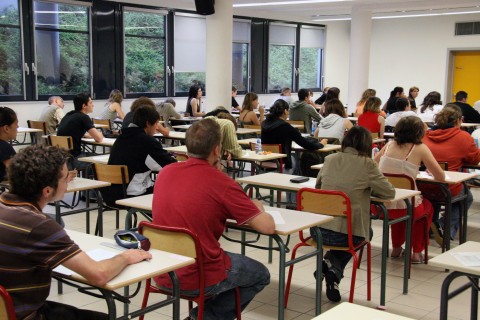
If you are a part of academia, you already know the significance of learning and mastering the native language to prove your worth to justify your position and presence at a particular institution in a foreign culture.
No matter whether you are a struggling teacher trying to make a fortune in Pakistan or a foreign student aiming at getting command over Urdu classroom words and phrases, you are required to consult an authentic Urdu language learning resource to make your dreams come true.
In this article, you will get an opportunity to learn about Urdu classroom phrases that not only emphasize the necessity of learning useful classroom phrases in Urdu in general but also help master the Urdu classroom phrases for students along with the classroom phrases for teachers in Urdu in particular.

 Table of Contents
Table of Contents
- Use Classroom Greetings
- Understand Instructions from Teachers
- Ask for Clarifications from Teachers and Classmates
- Explain Absence and Tardiness
- Talk about Favorite Subjects
- Check for School Supplies and Miscellaneous Vocabulary
- Conclusion
1. Use Classroom Greetings
In Pakistani educational institutions, it is customary for the students and teachers to greet each other before the class starts. Also, students are supposed to stand as the teacher enters a class to show their token of respect; it is a part of their school upbringing and also it becomes an integral part of the national curriculum of Pakistani schools and colleges.
In the following section of the article, you will be acquainted with some widely used Urdu greeting expressions. Let us have a look at them without any further delay.
السّلامُ علیکُم! سر، آپ کیسے ہیں؟
Assalam-u-alaikum! Sir, aap kesay hain?
Hello! How are you, Sir?
السّلامُ علیکُم! میڈم، آپ کیسی ہیں؟
Assalam-u-alaikum! Madam, aap kesi hain?
Hello! How are you, Madam?
You can respond to the question with the following sentence.
میں خیریّت سے ہوں۔ آپ کیسے ہیں؟
Mei kheriyyat say hun. Aap kesay hain?
I am fine. How do you do?
You can use the following expression when you depart from others in the school or college.
ٹھیک ہے، موسٰی۔ کل ملیں گے!
Theek hai, Musa. Kal milein gay!
Alright, Musa. See you tomorrow!
2. Understand Instructions from Teachers
You know that listening to and comprehending the teacher’s lessons in a classroom is the key to effective learning. If you cannot do this, you cannot expect to have a smooth sailing process of learning; therefore, we have brought down here a series of a few Urdu classroom sentences that an Urdu-speaking teacher usually speaks during the delivery of lessons. Remember them by heart and you can anticipate the following classroom activity in advance.
آج ہم جملے میں فعل کا استعمال سیکھیں گے۔
Aaj hum jumlay mein fael ka istemaal seekhain gay.
We will learn the use of a verb in a sentence today.
پیارے طلبا! اپنی کتابیں کھولیں۔
Pyaaray tulbaa! Apni kitaabein kholein.
Dear students! Open your books.
میری بات دھیان سے سنیں۔
Meri baat dhayaan say sunein.
Listen to my words carefully.
خاموش رہیں۔
Khamosh rahein.
Keep quiet.
کوئی سوال؟
Koi sawaal?
Any questions?

3. Ask for Clarifications from Teachers and Classmates
Having questions is always a good approach in classroom learning; therefore, if you come across any confusion and you want to clarify them through questioning, we appreciate it. To extend our support in the phenomenon of clarification we have brought the below-given Urdu expressions that will help you to get clarifications from your teachers and classmates under certain circumstances. Let us have a quick look at them here.
مجھے ایک مسئلہ درپیش ہے۔
Mujhay aik maslah derpeish hai.
I am facing a problem.
معافی چاہتا ہوں! مجھے آج کا سبق سمجھ نہیں آیا۔
Maafi chahta hun! Mujhay aaj ka sabaq samajh nahin aaya.
I am sorry! I did not understand today’s lesson.
The above sentence is for the male students, if the student happens to be a female, she can use the underneath given sentence.
معافی چاہتی ہوں! مجھے آج کا سبق سمجھ نہیں آیا۔
Maafi chahti hun! Mujhay aaj ka sabaq samajh nahin aaya.
I am sorry! I did not understand today’s lesson.
And the following three sentences below can be used by either male or female students.
کیا آپ یہ دوہرا سکتے ہیں؟
Kia aap yeh dohraa saktay hain?
Can you repeat it?
میرا ایک سوال ہے۔
Mera aik sawaal hai.
I have a question.
استاد نے کیا کہا؟
Ustaad nay kia kaha?
What did the teacher say?

4. Explain Absence and Tardiness
It is not unusual to get late sometimes due to an unavoidable situation but it does not license you to sit in the classroom without explaining the reasons behind your tardiness. Similarly, some exacting tasks may compel you to remain absent from the educational institutions in that case too you need to explain your positions. To cope with these situations, we have compiled a list of a few Urdu expressions that you can use to explain your absence and tardiness within the premises of a classroom easily. Give a thorough reading to the below-given list of sentences and remember them to use on an appropriate occasion.
میں اپنے بھائی کی شادی کی وجہ سے اگلے ہفتے سکول نہیں آ سکوں گا۔
Mei apnay bhai ki shaadi ki wajah say aglay haftay school nahin aa sakon ga.
Due to my brother’s wedding, I won’t be able to come to school next week.
The above-mentioned sentence is for males. If a female wants to use the expression she can modify it in the following way.
میں اپنے بھائی کی شادی کی وجہ سے اگلے ہفتے سکول نہیں آ سکوں گی۔
Mei apnay bhai ki shaadi ki wajah say aglay haftay school nahin aa sakon gi.
Due to my brother’s wedding, I won’t be able to come to school next week.
میں دیر سے آنے کے لیے معافی چاہتا ہوں۔
Mei der say aanay kay liye maafi chahta hun.
I am sorry for being late.
This sentence is for the masculine gender, females can change it in the following way.
میں دیر سے آنے کے لیے معافی چاہتی ہوں۔
Mei der say aanay kay liye maafi chahti hun.
I am sorry for being late.
معافی چاہتا ہوں۔ میری کار خراب ہونے کی وجہ سے مجھے دیر ہو گئی۔
Maafi chahta hun. Meri car kharaab honay ki wajah say mujhay der ho gai.
I am sorry. I got late for my car went out of order.
The female version of the sentence will be:
معافی چاہتی ہوں۔ میری کار خراب ہونے کی وجہ سے مجھے دیر ہو گئی۔
Maafi chahti hun. Meri car kharaab honay ki wajah say mujhay der ho gai.
I am sorry. I got late for my car went out of order.
کیونکہ میں بیمار تھا اس لیے گھر کا کام نہیں کر سکا۔
Kyun kay mei beemaar tha iss liye ghar ka kaam nahin ker saka.
Since I was sick therefore I could not do the homework.
Females can use the above-given sentence after making the following changes in it.
کیونکہ میں بیمار تھی اس لیے گھر کا کام نہیں کر سکی۔
Kyun kay mei beemaar thi iss liye ghar ka kaam nahin ker saki.
Since I was sick therefore I could not do the homework.

5. Talk about Favorite Subjects
Classroom gossip is one of the elements that excite your interest in class participation. Knowing others’ likes, dislikes, and favorite subjects and sharing your own become an integral part of such activities. To learn a couple of good ways to exchange such information, refer to the following section of the article.
مجھے کمپیوٹر سائینسز میں دلچسپی نہیں ہے۔
Mujhay computer sciences mein dilchaspi nahin hai.
I am not interested in computer sciences.
انگلش میرا پسندیدہ مضمون ہے۔
English mera pasandeedah mazmoon hai.
English is my favorite subject.
میں ریاضی میں اچھا نہیں ہوں۔
Mei riyaazi mei acha nahin hun.
I am not good at Mathematics.

·فہرستِ مضامین
Fehrist-e-mazaameen
Subject List
- اُردو
Urdu
Urdu
- انگلش
English
English
- معاشرتی علوم
Maasharti Uloom
Social Studies
- اسلامیات
Islamiyat
Islamic Studies
- طبیعیات
Tabiyaat
Physics
- حیاتیات
Hayaatiyaat
Biology
- کیمیا
Keemiya
Chemistry
- جغرافیہ
Jughraphiyah
Geography

6. Check for School Supplies and Miscellaneous Vocabulary
Last but not the least, the vocabulary concerning the school supplies and miscellaneous vocabulary makes a place in our article. It is quite necessary to know the names of school supplies and other important things because without knowing them in Urdu, you will not be able to give your hundred percent inside the classroom and it can impact your learning negatively. Therefore, it is recommended that you should make the following words, phrases, and expressions a part of your retentive memory and beef up your Urdu classroom vocabulary to get the maximum benefit from the classroom activities.
1- For Men:
کیا میں آپ کا قلم لے سکتا ہوں؟
Kia mei aap ka qalam lay sakta hun?
Can I borrow your pen?
2- For Women:
کیا میں آپ کا قلم لے سکتی ہوں؟
Kia mei aap ka qalam lay sakti hun?
Can I borrow your pen?
میری کتاب کھو گئی ہے۔
Meri kitaab kho gai hai.
I lost my book.
- قلم
Qalam
Pen
- کتاب
Kitaab
Book
- بستہ
Bastah
Bag
- کمرۂ جماعت
Kamrah-e-jamaat
Classroom
- کینٹین
Canteen
Canteen
- لائبریری
Library
Library
- کیلکولیٹر
Calculator
Calculator
- فٹّا
Futta
Ruler
- پینسل شارپنر
Pencil sharpener
Pencil sharpener
- پینسل
Pencil
Pencil
- · عمارت
Imaarat
Building
- کمرۂ امتحان
Kamrah-e-imtehaan
Examination hall

7. Conclusion
This article has introduced you to a set of basic and common classroom phrases in Urdu along with some must-know Urdu words and phrases for a class. It has also helped you learn classroom phrases in the Urdu language that can be termed to be the most frequently preferred Urdu phrases that students and teachers use in the classroom.
Moreover, this article has helped you learn Urdu classroom words to beef up your collection of Urdu vocabulary phrases required to do immaculate Urdu translation. Also, the article tops the Urdu lessons that can help you learn Urdu classroom sentences besides informing you about the basic Urdu phrases in general.
Now do you feel prepared to step into an Urdu classroom to test your Urdu language skills and surprise the native speakers with your recently acquired knowledge about Urdu school phrases and classroom vocabulary in Urdu? If you have achieved this excellence, we congratulate you; however, even if it is otherwise, do not worry and write to us at UrduPod101.com. We will get back to you at the earliest to address your questions and queries.
Besides that, forget not to be a frequent visitor of UrduPod101.com. It is a rich repository of Urdu language learning resources such as Urdu dictionary, Urdu pronunciation, Urdu vocabulary, Urdu grammar, etc. that will help you hone your integrated Urdu language skills ultimately.
Very Happy Urdu Learning!









